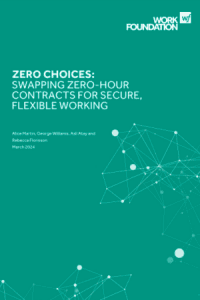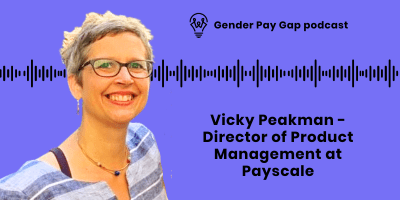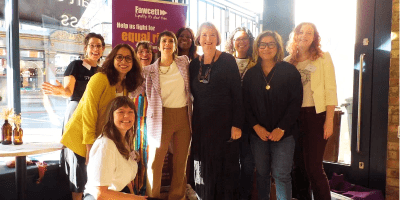Alice Martin is head of research at the Work Foundation, based at the University of Lancaster, where she leads groundbreaking research projects that aim to enhance workplace productivity and well-being. Alice has previously worked in various roles for the New Economics Foundation, as well as advising institutional investors on labour rights and industrial relations.

“…the gender pay gap is a stubborn and deplorable feature of the UK economy. It exists, we believe, in part due to the structural makeup of the jobs market…”
Educational background and career to date
For the last decade or more, I’ve been researching the UK labour market and I’ve focused particularly on insecure work, health and safety topics and also employer conduct, so the decisions that employers make in terms of how they treat their workforce. During that time, I’ve worked in all different types of organisations. I worked as a specialist advisor on employment rights in a corporate governance company and I’ve also worked in another think tank, the New Economics Foundation as head of work and pay.
Before that, I studied philosophy in London and Paris. Back then I was also very involved in economics and projects to think more progressively about what economics education could look like, so I was the founding trustee of an international educational charity called Rethinking Economics.
About the Work Foundation
The Work Foundation is a think tank. We’re based in London, but we’re part of Lancaster University, sitting within the Management School. We have brilliant academics across the university who feed into our work, but there are ten of us based in our London office.
Our big mission is to improve work and employment standards in the UK. We believe that everyone has the right to a secure and rewarding job. We work primarily through conducting research, but we also work with employers, trade unions, the Government and others who feed into that mission.
I manage a team of five talented analysts and policy experts. They have a brilliant range of interests and expertise. We have people focusing on how we can achieve healthier working lives and others looking into how we can make jobs more secure for people.
On a day-to-day basis, I work alongside my team by talking through their ideas and feeding back on their research findings. I also spend a significant amount of my time looking outwards beyond the organisation, going out to meetings and events with academics, employers, legal professionals and others, connecting with them to absorb their knowledge, as well as getting our work out to the right people when we need to.
From Zero Choices to real choices

Whilst there is still some conversation about whether they have a place in the UK labour market or not, our research suggested that most people employed in that way weren’t getting a good deal at all. They have very little access to basic employment rights. They have no predictability of employment, so when their wages are going to come in or how much they’re going to earn from month to month, and we felt that was a problem.
The methods we used to explore that further were that we looked at statistical evidence, including how many people are using zero-hour contracts in the economy at the moment. We found that there were record numbers of people employed in this way for their main jobs. This has risen to 1 1 million people, which we think is an issue.
We can fix this
We then looked at what other countries are doing about it. Every country has its own legal system for how they deal with employment rights, so every country is slightly different, but we did find several examples, including Germany, Ireland, the Netherlands and New Zealand, where they’ve taken action to regulate their zero hours contracts or ban them completely.
We looked at how they’ve gone about that and wrote about those. We also looked at some examples of employers here in the UK, including the pub chain, Wetherspoons. A few years ago, they gave their workforce a choice of either staying on a zero-hour contract, or receiving a minimum number of guaranteed hours so they could then take on extra shifts on top of the zero-hour contract is they wanted to but they would have that security of those minimum guaranteed hours
They reported that 99% of the workforce said: “yes please, we want the guaranteed hours”. For us, that was a clear indication that if people are given a real choice between zero hours and something more secure, then they will opt for something more secure. So, we wrote the paper on that basis. We also made some policy recommendations at the end for what we think politicians should do. The Wetherspoons example dispels some of the myths that employers can’t do this stuff. Some employers can and are making work more secure.
Gender pay gap: Stubborn and deplorable
As your readers will know, the gender pay gap is a stubborn and deplorable feature of the UK economy. It exists, we believe, in part due to the structural makeup of the jobs market. So, we have women often taking up low-paid, insecure jobs in an effort to gain some sort of flexibility and then to have a working life that fits around this. We think that is part of the problem of why we’re struggling to deal with the gender pay gap.
Zero-hour contracts are one form of those usually low-paid, very insecure roles, and it’s unsurprising therefore that women are much more likely to be in zero-hour contracts than men. In statistical terms, they’re 1.2 times more likely than men to be in those contracts. We don’t want to take that flexibility away from women at all, but we think that a lot of people aren’t actively choosing this type of job but they lack other more suitable options for flexible working.
So, what we’re recommending is that everyone would have a guaranteed minimum number of hours and that those hours could be arranged flexibly by agreement with the employer.
Breaking down structural disadvantage
We’ve also seen a prevalence of these contracts among young workers, probably unsurprising because they are often associated with students, but what we found was young people who aren’t students are also far more likely than other age groups to be in zero-hour contracts, and we think that’s a problem because it’s not giving them a good step up into the labour market. For many their first experience of work will be one where they have very little power and say over their working life and then we think that’s not a good thing.
We also found that black and other ethnic minority workers are more likely than white workers to be under zero-hour contracts. As are disabled workers, compared to non-disabled workers. So, our policy was designed from the perspective of those groups and the groups that we see are having a structural disadvantage in the labour market, as they appear to have less choice and less ability to access secure jobs that are flexible, so they’re opting towards zero-hour contracts because they lack the other options. We hope that the way we’ve designed the policy will see better security and better flexibility for those groups who are currently missing out.
Report coverage
We were delighted at the interest in this research. We were covered in the Times, the London Evening Standard, several other different newspapers, and also on BBC radio channels aimed at young people, so One Extra, BBC Asian Network and Newsbeat. We think it indicates that there is public appetite for change in this are so we’re glad to be getting out to as many people as we can.
Tell us about your own experiences
We’d love to hear from the Womanthology community on any of our social media platforms, whether that’s X or LinkedIn, which we’re increasingly using.
We have events coming up from time to time that are open to the general public and we encourage people to get involved and ask questions. They’re usually online events so they’re quite accessible to people across the country. We’re also very interested in engaging with female business owners. We like to work as much as possible with employers and small and medium-sized businesses, but also women who might be in senior positions in big organisations.
We would love to hear from you. Feel free to get in touch via our contact page on the website because we’re always looking for case studies of good practice, whether it’s in terms of offering secure jobs or secure flexible jobs, or in relation to health and wellbeing in the workplace.
We have a network of businesses that we work with and the more of them that have women in leadership positions, the better.
Making sure jobs are conducive to healthy lives
Coming up next for me, I am looking forward to a good break with my children and my family. We’ve had a busy but rewarding period in work recently but after that, we’ve got some brilliant publications coming out focusing more on health and how to make jobs inclusive of people’s needs, whether that’s mental health needs or physical health needs, so I’m excited to get stuck into that area.
Your readers will probably be aware that as a population we’re aging at the moment. We’re also getting sicker, which is not great, but we’ve got some ideas for how the world of work can give us more time to rest, recuperate and help care for us because we spend a lot of our working lives in jobs so we need to make sure that jobs are conducive to healthy lives.





